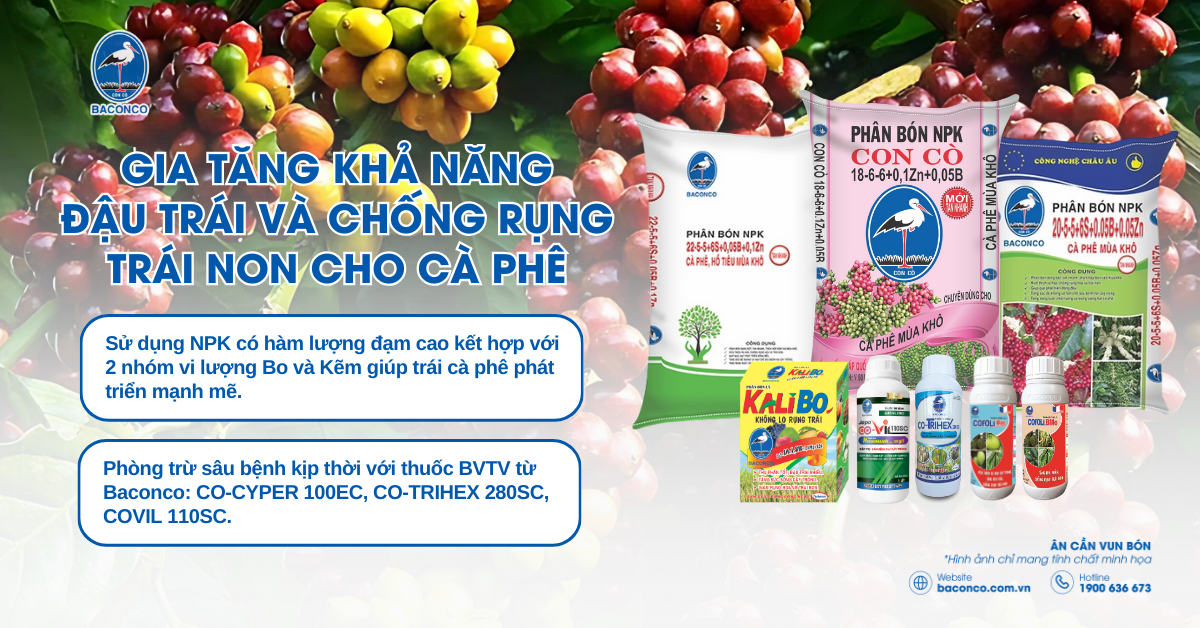Increasing Fruit Set and Preventing Premature Fruit Drop in Coffee With BACONCO
05 Mar 2025

Looking for solutions to improve coffee fruit set, reduce premature fruit drop, and achieve higher yields? Discover BACONCO's NPK CON CO fertilizers and effective solutions today!
The early fruit stage – An important milestone in coffee development
After coffee flowers are pollinated, the fruit enters a dormant stage, also known as the "early fruit stage". This is a critical period that determines the size and quality of the coffee beans later on. During this stage, the fruit primarily develops through cell division. If not provided with adequate nutrition, young fruit can easily drop off in large numbers, severely affecting yield.
In reality, if there are no proper care measures, the rate of young fruit drop can reach 30-40%, significantly reducing harvest output. Meanwhile, physiological fruit drop is a natural phenomenon, typically ranging from 5-20% depending on the coffee variety, cultivation conditions, and plant health.
Causes of young fruit drop in coffee plants
Nutritional deficiency
Nutrition plays a crucial role in the fruit setting and nurturing of coffee plants. In particular, nitrogen (N), potassium (K), boron (B), and zinc (Zn) are essential elements that help promote cell division and support sustainable plant growth. If the plant is not provided with enough of these nutrients, young fruit is very likely to drop from the early stage.
Additionally, unbalanced fertilization can also affect the stability of the plant. If the potassium level is insufficient, the cell structure of the fruit will be less stable, making it more prone to dropping under adverse weather conditions. Therefore, a reasonable fertilization regime is needed to help the plant develop steadily and minimize the occurrence of young fruit drop.
Adverse environmental conditions
During the rainy season, when soil moisture increases due to prolonged rainfall, the root system of coffee plants can easily fall into a state of oxygen deficiency. At that time, the nutrient absorption process is severely impaired, causing the plant to lack sufficient nutrients to maintain fruit development, leading to young fruit drop. Furthermore, cloudy conditions and lack of sunlight can reduce photosynthesis efficiency, directly affecting the plant error to nourish the fruit.
Conversely, during prolonged dry spells, soil moisture significantly decreases, making it difficult for the roots to absorb water and essential minerals, resulting in a higher rate of fruit drop. Without proper solutions, coffee plants will struggle to maintain optimal yield.
Pests and diseases attack weakening plants
In addition to environmental and nutritional factors, pests and diseases are also a major cause of coffee fruit drop. Pests such as mealybugs, rust fungus, and anthracnose can quickly weaken the plants, affecting their ability to absorb nutrients and retain fruit. Without timely control measures, these pests can reduce coffee garden yields by 20-30% in just one season.
Pest damage often occurs on coffee plants. Source: Internet.
Solutions to increase fruit set and prevent premature fruit drop from BACONCO
Providing complete nutrition with NPK CON CO fertilizer
Baconco recommends farmers use NPK formulations rich in nitrogen and supplemented with micronutrients Boron and Zinc to help coffee fruit develop robustly:
- NPK CON CO 20-5-5+6S+0.05B+0.05ZN.
- NPK CON CO 18-6-6+0.1ZN+0.05B.
- NPK CON CO 22-5-5+6S+0.05B+0.1ZN.
- Dosage: 250 - 500kg/ha.
Additionally, supplementing with foliar fertilizers helps plants quickly absorb nutrients and reduce fruit drop:
- Cofoli Bmo, Cofoli Bo150, KaliBo help enhance nutrient absorption and support plant health.
Adjusting the watering regime appropriately
Proper watering will help coffee plants grow steadily at each stage. During the dry season, the plants need to be watered adequately but should not be overwatered to avoid water logging that can cause root rot. Conversely, during the rainy season, an effective drainage system is needed to prevent flooding and oxygen deficiency for the roots, helping the plants maintain optimal nutrient absorption.
Timely pest and disease control with plant protection products from Baconco
To prevent pests and diseases that cause fruit drop, BACONCO provides specialized plant protection:
- Pest control for mealybugs: CO-CYPER 100EC.
- Fungus control for rust: CO-TRIHEX 280SC, COVIL 110SC.
Guidelines for fertilizing coffee plants in the early fruit stage
Experience in fertilizing coffee plants according to each growth stage. Photo: Internet.
Pre-bloom stage (preparing for fruit set)
Apply NPK CON CO 20-5-5+6S+0.05B+0.05ZN to provide sufficient nitrogen, helping the plant grow vigorously. Combine with foliar fertilizers containing Boron and Zinc to enhance the fruit set.
Early fruit stage (after flower pollination)
Use NPK CON CO 18-6-6+0.1ZN+0.05B or NPK CON CO 22-5-5+6S+0.05B+0.1ZN to enhance cell division. Supplement with KALIBO hoặc COFOLI BO150 to limit the dropping of immature fruit.
Fruit development stage (fruit begins to grow in size)
Continue applying NPK CON CO 22-5-5+6S+0.05B+0.1ZN at appropriate doses. Combine with foliar fertilizers for even fruit development and achieving the best quality.
The early fruit stage is a crucial time that determines coffee yield. Providing adequate nutrition, adjusting irrigation properly, and timely pest control will help increase fruit set and reduce the dropping of immature fruit. With NPK CON CO fertilizers and plant protection products from BACONCO, farmers can effectively optimize coffee garden yields.
Views
1073
